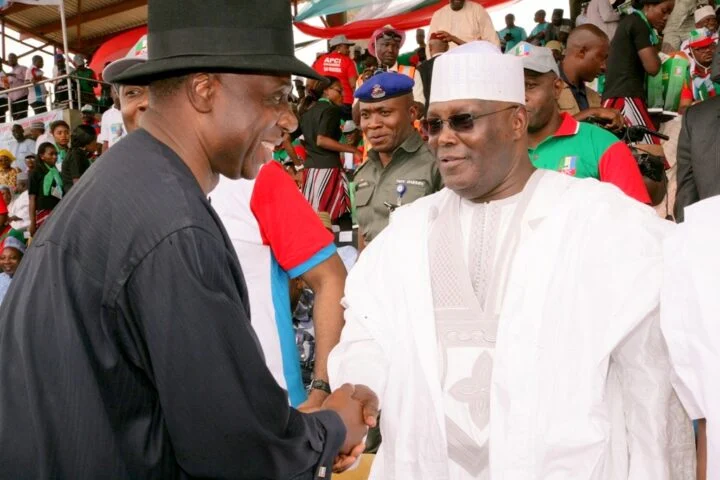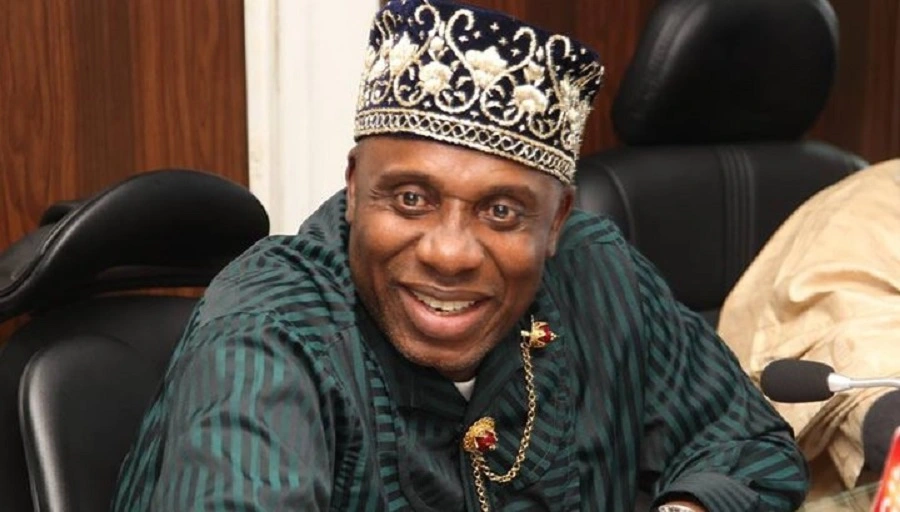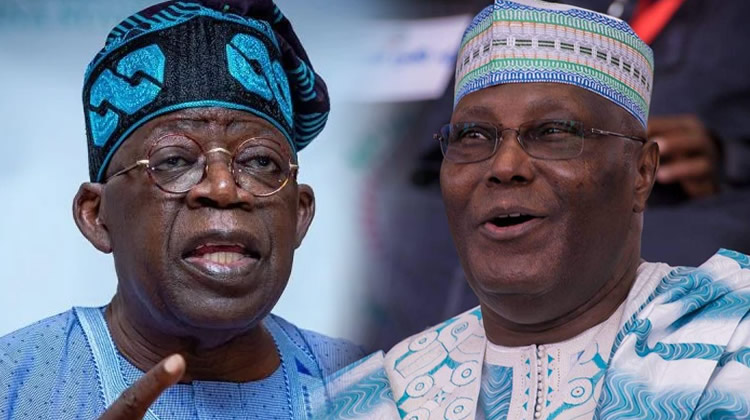Two Years in the Saddle: Tinubu, a political strategist, maintains his game
President Bola Tinubu crossed the halfway line of his administration’s first tenure on Thursday.
The president listed his achievements in a statement to mark the anniversary, amidst what appears to be a consensus on his politicking.
Despite the country’s unprecedented cost-of-living crisis and the resurgence of insecurity, Mr Tinubu’s All Progressives Congress (APC) continues to grow, with daily defections from opposition parties. Internal wrangling within the major opposition parties has left their leaders and likely presidential hopefuls facing uncertainty.
The Peoples Democratic Party (PDP), Nigeria’s main opposition party, has yet to recover from the 2022 primary election fallout. The situation has become pitiable following speculations that the presidential candidate of the party in the 2019 and 2023 elections, former Vice President Atiku Abubakar, may seek a coalition outside the party to actualise his ambition.
![Former Vice President, Atiku Abubakar. [PHOTO CREDIT: Official Facebook page of Mr Atiku.]](https://i0.wp.com/media.premiumtimesng.com/wp-content/files/2024/05/Screenshot_20240531_201416_Facebook.jpg?resize=720%2C549&ssl=1)
Other major opposition parties, the Labour Party (LP) and the New Nigeria Peoples Party (NNPP), have also endured so much battering that the political future of their 2023 presidential flag bearers, Peter Obi and Rabiu Kwankwaso, is up for deliberation.
Some have used words like “dead” and “in a coma” to describe the state of many of these parties. These adjectives typically define the state of the top parties.

Mr Obi, the 2023 Labour Party candidate, and former Kaduna Governor Nasir El-Rufai, who recently severed ties with the APC to join the Social Democratic Party (SDP), have blamed the APC and, by extension, President Tinubu for fuelling the crises in the opposition parties, though none could provide evidence to substantiate this claim.
![Peter Obi, presidential candidate of the Labour Party at the 2023 elections. [PHOTO CREDIT: Twitter handle of Peter Obi]](https://i0.wp.com/media.premiumtimesng.com/wp-content/files/2023/07/F1Ypo5CX0AYwy2Z-1-e1694117972526.jpeg?resize=900%2C507&ssl=1)
This development may have instigated some members of the opposition to opt for a coalition ahead of the 2027 poll.
There is a raging debate over whether Nigeria is sliding into a one-party state under President Tinubu’s leadership.
In the 24 months of his reign, over 30 members of the National Assembly, one governor, and several other lawmakers at the state level have moved to the ruling party.
Perhaps more shocking is the defection of Ifeanyi Okowa, the vice-presidential candidate of the PDP in 2023, to the APC.
Aside from the defections, several voices within opposition parties have joined the APC leadership, governors, and lawmakers to openly endorse Mr Tinubu for re-election.
The development, democratic as it is, has created fears in some quarters that Nigeria is sliding into a one-party state.

Bothered by the trend, some activists recently accused Mr Tinubu of “calculated and systematic“ moves to cripple the opposition ahead of his re-election.
Last Tuesday, the National Executive Committee (NEC) of the PDP rose from its 99th meeting to accuse the president and his party of intimidating the opposition and of a sinister plot to turn Nigeria into a one-party totalitarian state.
In a recent statement, Atiku, currently leading the coalition to stop Mr Tinubu and APC’s victory in 2027, vowed that opposition leaders would resist “any attempt to turn Nigeria into a one-party state where dissent is silenced and power is abused.
Former President Goodluck Jonathan also spoke on the issue, insisting that it is not the direction the country should go.
However, Mr Tinubu and his party have said that though the plot for a one-party state is not on the cards, they are not to blame for opposition figures abandoning their parties.
“Leaders worried about a one-party state do not need to fear. A one-party state is not by force; it is by negotiation. It is by other political parties seeing the effect of the positive governance of our party. If they decide to come to our party willingly, I think there is nothing wrong with that,” Abdullahi Ganduje, the APC national chairman, said.
“You don’t blame people bailing out of a sinking ship when they have no life jacket. I am glad of what we have, and I’m expecting more to come. That’s the game.
“We are in a constitutional democracy. Don’t forget that freedom of movement and freedom of association are not criminally punishable. Welcome to the progressives; sweep them clean,“ the president said at the recent APC National Summit.
While the blame game rages, some believe that the opposition has been unable to get its act together, hence the unnecessary cry about the alleged move to turn Nigeria into a one-party state.
According to Ezenwa Nwagwu, executive director of the Peering Advocacy and Advancement Centre in Africa (PAACA), many people talking about one-party states were recently in power and have a history of defection.
“It is my view that instead of getting carried away with all this talk about a one-party state, we should be paying closer attention to the way our politicians behave when they lose out on power, and how the opposition keeps falling short of its responsibility.
“Because let’s face it, if opposition parties, many of which were recently in power and have a history of cross-carpeting, are the ones raising the alarm over a one-party drift, then we need to seriously examine the state of our politics. It reflects a deeper institutional failure, where opposition is not grounded in ideology or accountability, but in personal ambition and survival.”
Mr Nwagwu further noted that “no ruling party anywhere in the world will fold its arms simply to avoid being accused of enticing members of the opposition.”
Like his predecessor, President Tinubu has a firm grip on his party structure. The recent massive endorsement of the president by the APC structure for a second term clearly indicates this.
The situation began some weeks ago when governors of the North-west and other elected officials from the APC in the region met and declared support for the president. Days after the declaration, the president announced new appointments that benefited many individuals from the region.
The endorsement was sealed at the APC National Summit at the Presidential Villa. Apart from the APC NWC, the party’s 22 governors and National Assembly members openly endorsed him for the presidency for a second term.
It is, therefore, unlikely that any other member of the party will have the guts to challenge the president in 2027. Pundits say the APC may end up printing one nomination form for the 2027 race, as the PDP reportedly did for former President Jonathan in 2015.
In any case, Mr Tinubu’s endorsement did not surprise many observers of Nigeria’s democracy.
Months after assuming power in 2023, Mr Tinubu, regarded as a political strategist, suffocated and weeded out some elements from the party that did not support his presidential ambition. One of them was the former National Chairman, Abdullahi Adamu, who was replaced with Mr Ganduje, a former Kano governor.
Before he assumed office, Mr Tinubu, as president-elect, did not adhere to the party’s existing zoning formula in deciding who would replace Mr Adamu, who hails from the North-central.
While the executives of major parties are grappling with internal crises, the APC is enjoying some stability. Mr Ganduje has survived initial opposition from the North-central region to which his position was zoned initially, particularly with the departure of Salihu Lukman, the party’s former national vice chairman, North-west.
Aside from the lack of opposition within the party, Mr Tinubu’s decision to appoint members of the NWC to boards of major MDAs has generated backlash among critics, who accused the president of using appointments for patronage.
Although such appointments are not new, the move is seen as a masterstroke to give the party officials a stake in the government.
Mr Tinubu came into power with political credentials spanning over 30 years, many of which were spent in the opposition. His ability to cut deals is well-documented.
A review of the president’s actions in the past 24 months, including the campaign period, shows a president who believes in deal-making, within and outside political parties.
Since taking office, Mr Tinubu has confirmed those beliefs. A notable one is the appointment of former Rivers State Governor Nyesom Wike as Minister of the Federal Capital Territory (FCT).
Mr Wike’s relationship with the president has been unconventional. Despite controlling significant structure in the PDP, including the unarguably polarised PDP Governors’ Forum and the National Working Committee (NWC), the former Rivers governor remains one of the most vocal voices for the re-election of Mr Tinubu. Many critics see the minister as an “agent of destabilising the opposition,” and the president allegedly indulges him for political advantage.

Mr Wike’s ongoing power struggle with other prominent PDP elements is viewed as primarily responsible for the opposition party’s disarray.
Apart from the FCT minister, the president has courted opposition governors and other figures. This deal-making with the opposition may explain some part of the president’s strategy of offering inclusive incentives.
Analysts believe that the removal of the petroleum subsidy, which has increased the fiscal position of many states, endears Mr Tinubu to the governors.
The Federation Accounts Allocation Committee (FAAC) disbursed an unprecedented N15.26 trillion to federal, state, and local governments in 2024, representing a historic high in revenue distribution and a 43 per cent increase compared to previous years.
The president and governors were on a collision course over the Tax Reform bills, which the governors openly opposed. Before things escalated, the president reached an agreement with the governors on the bills and an agreement was reached over the contentious issues, particularly the VAT sharing formula.
In an interview with PREMIUM TIMES on Thursday, Mr Nwagwu summarised Mr Tinubu’s style this way: “Whereas his predecessor (Muhammadu Buhari) could not be accessed easily; sometimes, you have to go through an intermediary, this president (Tinubu) is accessible, not just to governors of his party but also to opposition governors.
“He has also freed resources to the states. Some of these states have been able to pay their debts. He is using different methods to endear himself to his kind.
“People are talking about the way people are defecting. It’s not surprising because he is deploying patronage and cronyism. You didn’t need a unity government but he has opened the door to other parties, even in appointments.”
Mr Tinubu appears to be targeting some form of working alliance in the region ahead of the election.
To be sure, in the past 24 months, the president’s party, APC, has significantly enlarged its base in the South, particularly in the Niger Delta. Bayelsa State is now the only state outside the control of the ruling party in the South-south.
The APC won the Edo State governorship election and gained Delta State through the defection of Governor Sheriff Oborevwori. Governor Umo Eno of Akwa Ibom State is only a step away from the ruling party.
Similarly, in the South-east, although only Ebonyi and Imo states are under the control of the APC, Mr Tinubu has given the region some attention. In the last year, he has visited Enugu and Anambra states. While there are speculations that Governor Peter Mbah of Enugu State may support the president, Governor Charles Soludo of Anambra has removed all pretence by openly endorsing the president for a second term.
Although the governors’ support is largely seen to be a strategy to win a second term, it is also speculated that the development is prompted by increasing opposition from some elements in the North, where Mr Tinubu secured over 50 per cent of votes in the 2023 poll that brought him to power.
Indeed, the Atiku-led coalition seems to be mainly composed of northerners, some of whom believe power should return to the region. However, except for Mr El-Rufai, some northern leaders, including Abubakar Bagudu, Mohammed Badaru, and Bello Matawalle, who provided the president with substantial support in 2023, are still with him.
Many believe that the National Assembly is one institution President Tinubu has pocketed.
Ever before assuming office, the president ensured full control of the federal legislature and apparently ensured his administration’s stability. He single-handedly chose the four presiding officers and, to a very large extent, the principal officers.
Way before the inauguration of the two chambers, Mr Tinubu picked Godswill Akpabio as senate president and Barau Jubrin as his deputy. He chose Abbas Tajudeen and Ben Kalu in the House as speaker and deputy speaker.
Analysts said the president was clearly trying to avoid the pitfall of his predecessor, Mr Buhari, who did not pay much attention to that in his first term. This was why Bukola Saraki and Yakubu Dogara emerged as senate president and speaker.
Therefore, it is no wonder that Mr Tinubu’s bills and other requests, including appointments, received little or no opposition from the lawmakers, prompting some Nigerians to brand them “rubber stamp lawmakers.”
Apart from choosing the parliament’s leadership, the president is believed to have deployed a financial incentive strategy in the National Assembly. The legislature’s annual budget increased from N165 billion to N344 billion within two years.
When Bauchi Central senator Abdul Ningi alleged budget padding in 2024, Mr Tinubu, a former senator, looked the other way and even justified the lawmakers’ actions. BudgIT, a think tank, also recently published a report alleging that lawmakers included over N6 trillion in the 2025 budget. The president may not also bother.
When the presidency announced a planned presidential broadcast on 18 March, very few may have predicted the suspension of Governor Siminalayi Fubara of Rivers State.

This explains why it was shocking to many when the president suspended not only Mr Fubara but also all elected officials in the state.
In the broadcast, Mr Tinubu said he made political interventions, which he blamed the governor for breaking. While some had expected the declaration to fail to get support at the National Assembly, many were shocked to see the lawmakers using voice votes to confirm the suspension. It is speculated that in some quarters, the president, a known democrat, used Mr Fubara’s case to send a message to all governors to fall in line or be victims of the stick.
Aside from Mr Fubara’s removal, activists have also alleged a decline in electoral integrity under President Tinubu.
YIAGA Africa, an election observation organisation, scored the Edo governorship election low. A similar verdict was made on the Kogi governorship election. This perceived lack of credibility in elections and the return of the “federal might” have led to politicians looking to Abuja for protection.
Also, Mr Tinubu, whose wife, Oluremi, is a pastor, has been making overtures to the Christian communities, many of whom vehemently opposed the Muslim/Muslim ticket in 2023.
Establishing a university in southern Kaduna and making a recent visit to Vatican City are good optics. However, the insecurity in the Middle Belt and the dire economic situation present strong campaign talking points for the opposition. The anti-Muslim-Muslim ticket sentiment has, however, reduced considerably.
Mr Nwagwu says Mr Tinubu’s style should not be a surprise given his antecedents as an opposition politician.
“The president prepared for power. He was clear about how to get to power. He knew that all that was required was the majority to vote and spread. This is someone who knows what is required to become president.
“He never contested for that position before, never took up any appointment after leaving office as governor. He is a man you have to watch politically.
“He stood as an opposition figure, using his resources and energy to mobilise and hold the opposition together. He never took up appointments or took contracts, to the best of our knowledge.
“Those who are defecting have no stamina for the long haul, which Tinubu is synonymous with being in opposition for two decades. He was a problem to governments and even helped the opposition to take over power,” he told PREMIUM TIMES.













